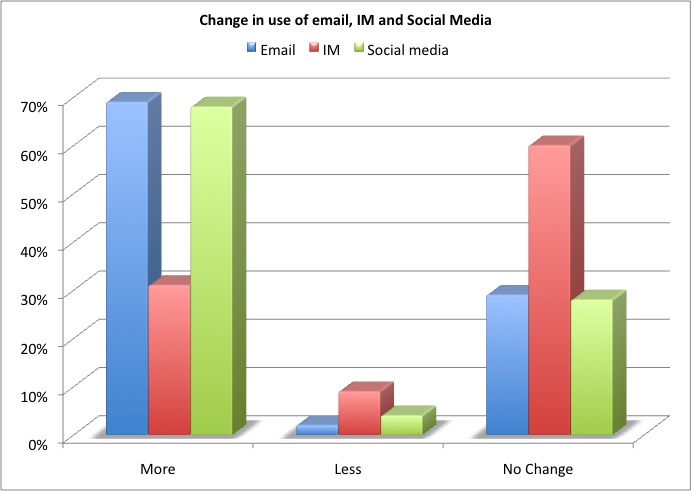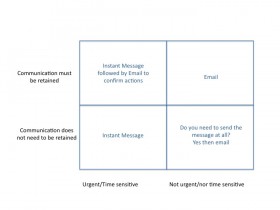The CIPD annual survey for well being shows that sick leave has fallen by nearly a day. Good news. The bad news is that stress and muscular skeletal problems (back pain RSI and eye strain) are two of the main reason for taking sick leave. Indeed cases of ‘ipad shoulder’ have now been reported. Email overload is still a major contributor to stress levels, not to mention the time spent at the inbox slumped over a keyboard which rises the risk of muscular skeletal problems.
Some postulate that email is in decline and hence we might hope that is email overload and it’s twin sister ’email stress’. The main reason given for the decline in email is the rise in use of social technologies like SharePoint, instant messaging (IM) and alike.
email is the rise in use of social technologies like SharePoint, instant messaging (IM) and alike.
Our recent survey on the ‘state of the inbox’ for the ITDF Autumn Conference revealed that email traffic is far from declining. Mesmo Consultancy like others are witnessing a dramatic increase. Business users now receive on average 77 emails per day which represents a rise of 26% over the last few years. Interestingly however, most feel that only 47% of these emails are necessary. Dealing with the unnecessary emails (excluding spam) is now costing organisations nearer 31 days per person per year in comparison to the 21 we witnessed a few years ago. So much for the push to lean and mean and improved efficiency.
Is your organisation paying too high a price for the pleasure of using email? Click here to check how much email overload is costing you in lost productivity.
So what of all the talk about social technologies being the nirvana to solve all the challenges which email possess? Our study revealed that about half the participants are using such technologies but they are not truly embedded in many as a replacement for email. Discussions at the ITDF supported this finding.

Haystacks by Monet
Social technologies bring with them their own set of challenges not least more emails as alerts to new postings etc. Then there is the information overload as more people feel they must share ever more information. It takes a skilled knowledge worker to pick out and pull in just what is really relevant. It’s akin to finding a needle in a haystack and is a skill few either possess or are taught.
Piling social technologies on top of email is not the solution. It just adds to the information overload and ramps up even further the stress and time we need to spend slumped over our keyboard.
One solution to driving down stress related sick leave is to implement such technologies as part of the information and communications strategy. However users must also be properly educate about when, where and how to use these technologies and email properly. Not surprisingly less than a third had any education and training in how to use effectively email and social technologies. (This is very similar to previous findings.)
We have commented on the effective use of IM and there will be more in the next blog. Meanwhile, we would be delighted to talk to you about how we can help you drive down and out the pernicious 21st century office disease of email overload and the associated stress.
Our current research into the future of email reveals that information overload is increasing. What is your organisation doing to help people use email and social technologies effectively to reduce email and information overload and hence time wasted at the computer?
Tags: email management training, email overload, email stress, future of email, Instant messaging, Mesmo Consultancy, social technologies
Can Instant Messaging (IM) help to significantly reduce email overload? Over the last few months I’ve been working remotely with a client and using their IM in earnest (via Microsoft Communicator). I was able to catch up with colleagues on business and social matters quickly and without ending up with an inbox full of redundant email chains.
At one point urgent help was needed from a colleague whose status was ‘busy’. A quick message and back came the necessary data with a note that all the other matters would need to wait until our planned conference call later that week. Still the vital data was supplied and work could progress.
Would the same have happened with email? No, as he is a strict disciple of the ‘stay focused’ management school. His new email alerts are off and he only checks his inbox every couple of hour or so. He works on the basis that if it is urgent someone will either call or send him an IM.
Email has been around for just over 30 years and is now seen by many as the default communications channel. But is it really that useful for all electronic communications? Mimecast found only about 30% of emails received are read. Meanwhile the Grossman Group found that middle managers are overwhelmed by email and often spend long hours outside work catching up with their email. But what are all these emails they feel they must read or at least spend time deleting)? We and Grossman found that about 25 to 30% are indeed trivial often either chains (ongoing conversations) or about subjects that are no longer relevant (eg fire alarm is being tested at 11.00am).
Email is but one of a range of communications channels (from face-to-face meetings to text messaging). Is it time to start thinking through how we can use alternatives to email firstly to communicate more efficiently and hence secondly reduce the email overload which is crippling many people and their businesses? Have you checked recently how much time you and your business are loosing through unnecessary (internal junk) email?

For me IM is hugely undervalued as a communications tools. If I were CEO of an organisation (no matter what size) I would not ban email internally as some have done but would implement an IM policy.
All message which do not need to be retained and are time sensitive should be sent by IM and not email as per this matrix.
Are you using any form of social media and IM to reduce the volume of email traffic and improve communications? Click here to participate in our new survey.
Tags: alternatives to email, email chains, email management, email overload, IM, Mesmo Consultancy